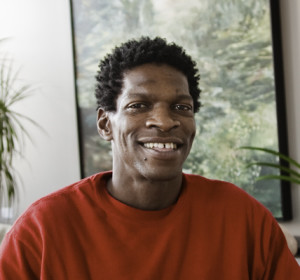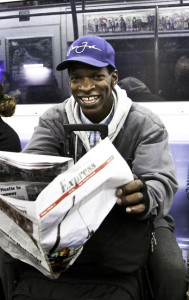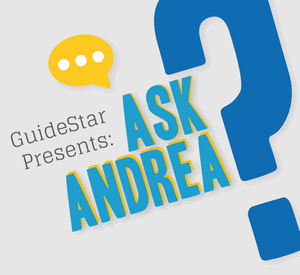 Next month, my friend Clemetin will celebrate six full years of being out of prison. According to the statistics of the Bureau of Justice, three-quarters of all of the people released from prison get rearrested within five years.
Next month, my friend Clemetin will celebrate six full years of being out of prison. According to the statistics of the Bureau of Justice, three-quarters of all of the people released from prison get rearrested within five years.
And indeed, Clemetin has been rearrested. Not once, but several times. He’s been arrested for trumped up drug charges he wasn’t guilty of, and he’s been arrested for shoplifting, which he did. He’s never ended up back in prison, but he gets picked up again and again.
An Unlikely Friendship
When I first met Clemetin, the very idea of being friends with someone who would be arrested again and again seemed strange. But over the years of our friendship, my views have changed and I’m no longer so quick to judge.
It’s easy to condemn someone for stealing. In fact, it’s easy to assume that when someone is picked up for selling heroin, they really did it. But I’ve learned from Clemetin not to dispense my judgements so carelessly. Because most of what I believed simply isn’t true.
When Clemetin and I first got acquainted, I thought I could change him. In retrospect, he’s the one who’s changed me.
Lessons I’ve Learned
Through my friendship with Clemetin, I’ve learned three valuable lessons about life.
1. You aren’t born with life skills — you learn them.
When Clemetin was released from prison in 2009, he had spent more than 27 years in prison. And before prison, he had been in and out of juvenile detention centers. During those years, he learned to keep his head down and do what he was told. That was challenging for him and he’d give the correction officers lip and would wind up in solitary confinement for long stretches.
I’m sure Clemetin learned a great deal during those years, but they didn’t include administrative skills. He learned how to protect himself and how to look big and threatening enough so that people wouldn’t “mess with him.” He learned how to survive when he touched the edge of insanity in solitary confinement.
But he didn’t learn life skills.
He didn’t learn how to make appointments. He didn’t learn how to navigate the public transportation system. He didn’t learn how to show up on time. He didn’t learn how to take initiative. He didn’t learn how to manage conflicting priorities. He didn’t learn how to manage a household or to buy groceries or pay his rent or save money. He didn’t learn how to read a subway map or use a cell phone or… well, really, he didn’t learn most of the skills you need to run your life.
 To give you a very practical example, the first time I gave Clemetin instructions about how to use the subway to get to an appointment, I neglected to tell him that the big arrows pointing up really meant go straight ahead. He told me later that he had spent some time that day looking for a stairway up!
To give you a very practical example, the first time I gave Clemetin instructions about how to use the subway to get to an appointment, I neglected to tell him that the big arrows pointing up really meant go straight ahead. He told me later that he had spent some time that day looking for a stairway up!
This is NOT stupidity. Clemetin simply had never had the opportunity to learn the graphic conventions you and I learned along the way and now take for granted.
2. Not everyone can manage a regular job.
You need administrative skills to hold down a regular job. And if you haven’t learned those skills over the course of your life, it’s very difficult to learn them later. Your brain hasn’t developed the right pathways. So not only is it just about impossible for Clemetin, a convicted felon, to GET a job. If he did, I don’t think he’d have the kinds of administrative abilities he’d need to succeed.
He’d have trouble showing up on time, day after day. He’d have trouble not getting into scuffles when he felt disrespected. When he faced competing priorities, he’d be unable to figure out what to do.
Now, don’t get me wrong. Clemetin is GREAT worker. He likes to work hard. He likes to do a good job. And he’s tremendously proud of his ability to use his strength and determination to accomplish tasks you and I would have trouble doing. But without basic administrative abilities, he simply can’t hold a job.
Just so you know, we’ve introduced Clemetin to several artists who hire him to do all sorts of things. They treat him with respect and give him clear and specific instructions and they keep an eye on his progress to make sure he’s got it right. With that kind of care, he’s a superstar!
While the work isn’t steady, it does make him feel useful and needed and puts a bit of money in his pocket.
3. When you have no options, you make different choices.
I’ve never not had money. I mean, really not had money. Not two cents or a quarter or a dollar in my pocket. No subway card. No money for a cup of coffee and a donut. No money to buy soap or razors to shave or food. How about you?
I’ve never woken up hungry only to find no food in my refrigerator and not a penny in my pocket. And I’ve never doubted that if I were in trouble, my family and friends would help me through. Have you?
If that were the situation in which you found yourself, with no money, no food, and no one to count on, believe me, you, too, would make different decisions. You’d do what you needed to do to stay alive, including shoplifting now and again.
Is it any wonder that three quarters of the people who are released from prison are picked up again within five years? Many of them, like Clemetin, have no choice.
Clemetin wants nothing more than to be useful and to have enough money in his pocket to cover the basics. He wants to be respected and appreciated for his good qualities. He is kind and loves to help people and works hard. But when he has no other way to survive, he’ll do what he has to do.
If you think about it, I’ll bet you’ll find that description applies to you, too.
Don’t Be So Quick to Judge
I find it uncomfortable to imagine what it would feel like to have nothing. Even a minute thinking of that makes my stomach turn. But the next time you walk by someone who looks down and out, imagine what it would feel like to be in their shoes, even for only a minute.
There may be nothing you can do to help. But perhaps you can drop your negative judgment and look that person in the eye. Perhaps you can nod or say hello. And that little bit of non-judgmental contact might make a wee difference in their life.
Imagine having nothing and not knowing where to turn?
Think hard — what does that feel like? And as you imagine that scenario, can you begin to empathize with the plight of so many people who find themselves in that situation?
Share your thoughts in the comments.
